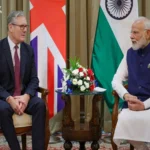Indian Rafale Jets Retreat Amid Rising Tensions
In the early hours of April 30, 2025, four Indian Rafale fighter jets were detected patrolling over Indian-administered Kashmir. Upon their detection, the Pakistan Air Force (PAF) promptly scrambled its jets, leading to the Indian aircraft retreating without crossing the Line of Control (LoC). This incident underscores the heightened alertness and readiness of both nations’ air forces amid escalating tensions.
The aerial encounter follows Pakistan’s recent downing of two Indian drones that allegedly violated its airspace in Azad Jammu and Kashmir. These developments have intensified the already strained relations between the two nuclear-armed neighbors.
Diplomatic Strains and Military Posturing
The recent surge in military activities is rooted in the April 22 terrorist attack in Pahalgam, Kashmir, which resulted in the deaths of 26 individuals, predominantly tourists. India has attributed the attack to Pakistan-based militants, a claim that Islamabad vehemently denies. In response, Indian Prime Minister Narendra Modi has granted the military “complete operational freedom” to respond to the attack.
Pakistan’s Information Minister, Attaullah Tarar, has warned of credible intelligence suggesting an imminent Indian military strike within the next 24 to 36 hours. He emphasized Pakistan’s readiness to respond decisively to any aggression, highlighting the nation’s commitment to safeguarding its sovereignty.
Concurrently, diplomatic efforts are underway to de-escalate the situation. U.S. Secretary of State Marco Rubio is scheduled to engage with the foreign ministers of both countries, urging restraint and emphasizing the importance of dialogue. Similarly, the United Nations has called for maximum restraint, offering its good offices to support de-escalation efforts.
Regional Implications and International Concerns
The escalating tensions have broader implications for regional stability. The suspension of the Indus Waters Treaty by India and the closure of Pakistan’s airspace to Indian airlines signify a deterioration in bilateral relations. Furthermore, the Pakistan Stock Exchange experienced a significant downturn amid fears of conflict.
International actors, including Saudi Arabia and Oman, have expressed concern over the situation, advocating for diplomatic resolutions. The global community remains watchful, recognizing the potential ramifications of a conflict between two nuclear-armed states.







